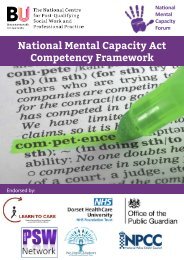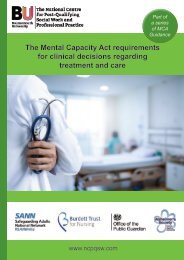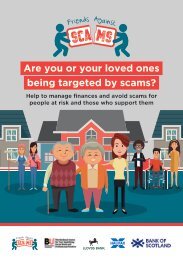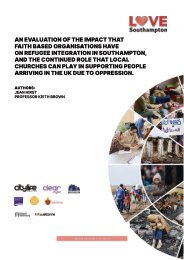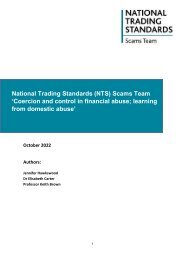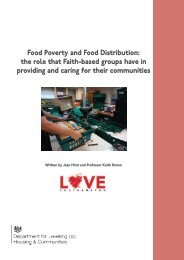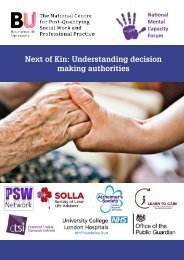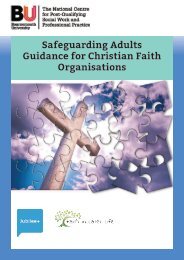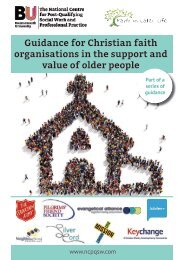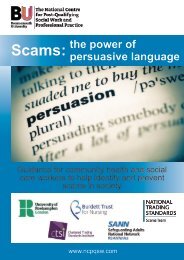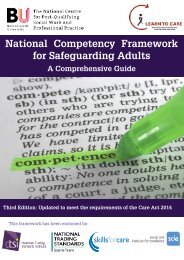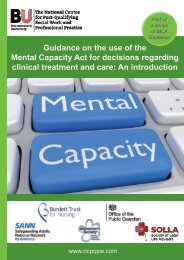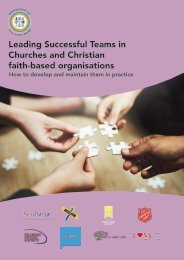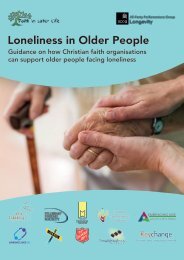Theft & Fraud whithin Families with bleed v2
You also want an ePaper? Increase the reach of your titles
YUMPU automatically turns print PDFs into web optimized ePapers that Google loves.
Financial<br />
Vulnerability<br />
Taskforce<br />
A SAFE<br />
PAIR OF HANDS<br />
theft<br />
and<br />
fraud<br />
<strong>with</strong>in<br />
families
Foreword<br />
It is a common misconception that financial abuse –<br />
including theft and fraud – is inflicted by individuals or<br />
organisations at arms-length, by people largely unknown<br />
to the victim. However, anecdotal evidence has for some<br />
time suggested that a significant amount of financial<br />
abuse is inflicted by those much closer to home, namely<br />
family members.<br />
Back in 2008, a report for Help the Aged stated that<br />
not only was 70% of financial abuse of older people<br />
perpetrated by family members, but it also estimated<br />
between 60 to 80% of these crimes took place in the<br />
home. Whilst there is not an extensive list of up-to-date<br />
research, we do know that around 50% of financial abuse<br />
in the UK is perpetrated by adult children of the victim.<br />
Furthermore, we know that whilst theft and fraud <strong>with</strong>in<br />
families is not restricted to older people, demographic<br />
changes including living longer will undoubtedly increase<br />
its prevalence, <strong>with</strong> property and complex financial<br />
resources a challenge for many to manage over time.<br />
To this end, I welcome this report by the independent<br />
Financial Vulnerability Taskforce, to highlight ‘the<br />
elephant in the room’, spread awareness and spark<br />
discussion.<br />
As we look to unlock our society and return to some<br />
semblance of a normal way of life, we must address the<br />
financial impact the pandemic has had, so tackling the<br />
rise in fraud and financial scams sits at the heart of this<br />
response.<br />
We need to better understand the scale and nature<br />
of financial abuse in families. Only then can we move<br />
forward together to ensure it is both prevented and<br />
responded to effectively. The potential scale of this<br />
threat to our loved ones and the consequences across<br />
society are simply too great to be ignored any longer, so<br />
I commend this report to colleagues across the House<br />
who I know share my desire to build back better from this<br />
pandemic.<br />
Craig Tracey MP<br />
Chair, Insurance and Financial Services APPG<br />
2<br />
Financial Vulnerability Taskforce · Financial <strong>Theft</strong> and Vulnerability fraud <strong>with</strong>in Taskforce families <strong>Theft</strong> and fraud <strong>with</strong>in families 3
Foreword<br />
Foreword<br />
(continued)<br />
Our understanding of financial fraud and scams has<br />
significantly developed over recent years. Indeed, most of<br />
us receive texts, emails and phone calls on a weekly, and<br />
sometimes almost daily basis, from criminals attempting<br />
to defraud us out of our savings.<br />
I have had the privilege of leading the national research<br />
into fraud and scams for the Chartered Trading Standards<br />
Institute and the National Trading Standards Scams<br />
team for a number of years now and this has included<br />
producing a number of All Party Parliamentary Group<br />
reports into this area. Indeed, it has been pleasing to see<br />
the way in which society and the financial sector now<br />
have a much greater understanding and appreciation of<br />
the problem of fraud and scams. We have made great<br />
progress in society understanding that this is a serious<br />
crime, often driven by organised criminal gangs affecting<br />
many people <strong>with</strong> devastating consequences.<br />
However, the more I seem to speak and write about this<br />
issue the greater seems to be the feedback that I receive<br />
from individuals describing theft and fraud <strong>with</strong>in families.<br />
People contact me in a very distressed state to talk about<br />
how a close relative has taken money <strong>with</strong>out permission<br />
or knowledge from another family member. This is not<br />
just one or two ex<strong>amp</strong>les, but increasingly is becoming<br />
the majority of stories I come across. What is clear is that<br />
very few crimes from <strong>with</strong>in families are ever reported to<br />
the authorities.<br />
It reminds me as an experienced social worker that when<br />
we started to use the term ‘child abuse’ in the 1980s<br />
(prior to this we used the term ‘non accidental injury’), we<br />
assumed that the perpetrator was a stranger (indeed we<br />
often used the phrase ‘stranger danger’); however, we<br />
now appreciate that the majority of abusers are known<br />
to the victim and are often family members. In the same<br />
way – although it is clear that criminals are behind many<br />
frauds and scams and that this is an important message<br />
to get out into society – we appear to have overlooked<br />
the scale and impact of fraud and theft <strong>with</strong>in families.<br />
I was fortunate to meet Jennifer Hawkswood, an<br />
experienced social worker <strong>with</strong> a wealth of expertise<br />
in the area of safeguarding including fraud, almost<br />
two years ago and we began to discuss this issue and<br />
discovered that we had very similar views about this<br />
matter. During the covid-19 lockdown we decided to start<br />
to write something on this subject.<br />
This coincided <strong>with</strong> the development of the Financial<br />
Vulnerability Taskforce which was being supported by the<br />
Personal Finance Society. I have been a member of this<br />
Taskforce since its inception and thus I approached the FVT<br />
<strong>with</strong> the idea of using this developing work as the basis of<br />
an APPG report. This was the genesis of <strong>Theft</strong> and <strong>Fraud</strong><br />
<strong>with</strong>in <strong>Families</strong> – the elephant in the room.<br />
A number of individuals and organisations have commented<br />
on this report and helped to draft it. Colleagues from <strong>with</strong>in<br />
Trading Standards, including the national team and city<br />
of London team, the National Association of Finance and<br />
Assessment Officers in local government, the Association<br />
of Public Appointed Deputies, the National Safeguarding<br />
Adults Boards managers network and of course the FVT,<br />
to name a few, have kindly offered their input and wisdom<br />
and we are truly grateful for this. Personally, I also want to<br />
acknowledge the input from Jennifer, who has been the<br />
lead author and <strong>with</strong>out her commitment we would not<br />
have got this report off the ground.<br />
When we consider theft and fraud <strong>with</strong>in families what we<br />
don’t yet have an understanding of is the motivation. How<br />
much is an attempt to avoid paying care home fees, or<br />
to avoid inheritance tax? Or is it simply relatives believing<br />
the money is theirs by right, as they will inherit it anyway,<br />
so they are simply ‘accessing it’ early. We simply do not<br />
know and thus this report is a compilation of the little that<br />
is known, coupled <strong>with</strong> a call for more research to better<br />
understand the scale and impact of this issue. We all know<br />
it’s a problem we simply do not know how big a problem it<br />
is, but it’s likely to be massive!<br />
It is clearly a very sensitive subject, and it is likely that<br />
‘toes will be trodden on’ as we look into it further, but it<br />
really needs to be done. It is not just organised crime and<br />
individual criminals who undertake and commit fraud<br />
and scams, it is also hidden <strong>with</strong>in families and we simply<br />
must look into and investigate this further. On behalf of the<br />
Financial Vulnerability Taskforce, Jennifer and I commend<br />
this report to you <strong>with</strong> the sincere desire and hope that we<br />
can all come together to find ways to better understand this<br />
issue.<br />
Professor Keith Brown<br />
Chair, Safeguarding Adult National Network<br />
Member, Financial Vulnerability Taskforce Steering Group<br />
3 4<br />
Financial Vulnerability Taskforce · Financial <strong>Theft</strong> and Vulnerability fraud <strong>with</strong>in Taskforce families <strong>Theft</strong> and fraud <strong>with</strong>in families<br />
4<br />
Financial Vulnerability Taskforce · Financial <strong>Theft</strong> and Vulnerability fraud <strong>with</strong>in Taskforce families <strong>Theft</strong> and fraud <strong>with</strong>in families 5
Executive<br />
summary<br />
What are<br />
we seeking?<br />
• There is a lack of awareness about this issue amongst<br />
the public and some safeguarding partners. Others<br />
are struggling <strong>with</strong> the difficulties faced by the conflict<br />
between the right to make unwise decisions and<br />
statutory safeguarding duties around protection<br />
• Financial abuse including theft and fraud <strong>with</strong>in<br />
families needs to be researched and best practice<br />
guidance for safeguarding partners and other<br />
agencies developed.<br />
• The cost to individuals and tax payers through public<br />
health implications, care fee debts, and to agencies<br />
investigating concerns is significant<br />
• The issue does not just affect local authorities. There<br />
is a widespread harmful impact across agencies and<br />
society<br />
This paper seeks to prompt discussion on all aspects of<br />
financial abuse <strong>with</strong>in families. This includes theft, fraud,<br />
coercive control, extortion, grooming and scamming - not<br />
an exhaustive list. While agencies view this through their<br />
own lenses and are likely to use different terminology,<br />
the purpose of this paper is to attempt to unite us on a<br />
common objective: the need to work more effectively<br />
together to prevent and reduce the harm that it causes,<br />
however we define it. This paper aims to:<br />
• increase joint working <strong>with</strong>in organisations on<br />
prevention and resolution of concerns<br />
• spread awareness amongst safeguarding partners<br />
and others about the issue and prompt greater<br />
collaboration<br />
• support discussions between agencies to agree<br />
and understand their differing terms, roles and<br />
responsibilities<br />
• support research on this issue and identify best<br />
practice guidance to share amongst partners and<br />
others to empower our workforces to deal <strong>with</strong><br />
these concerns<br />
• encourage production of an all-party parliamentary<br />
report seeking official recognition of the need for<br />
further research and support to safeguarding<br />
partners to tackle this issue<br />
• spread awareness in the general public about<br />
financial abuse (similar to that of work around scams<br />
and Trading Standards).<br />
5 6 Financial Vulnerability Taskforce · Financial <strong>Theft</strong> and Vulnerability fraud <strong>with</strong>in Taskforce families <strong>Theft</strong> and fraud <strong>with</strong>in families<br />
6 Financial Vulnerability Taskforce · Financial <strong>Theft</strong> and Vulnerability fraud <strong>with</strong>in Taskforce families <strong>Theft</strong> and fraud <strong>with</strong>in families 7
What is the<br />
problem?<br />
What is the problem?<br />
(continued)<br />
‘<br />
Victims are often<br />
reluctant to report<br />
their loved ones –<br />
comparisons can<br />
be drawn here<br />
<strong>with</strong> domestic<br />
abuse and we need<br />
a much greater<br />
understanding<br />
of the impact of<br />
coercive control on a<br />
person’s finances.’<br />
The lack of national research into theft and fraud<br />
<strong>with</strong>in families has far reaching consequences across<br />
society. We don’t understand the scale or nature of<br />
the problem, meaning we are not able to identify and<br />
share best practice in prevention and action when it is<br />
believed to transpire.<br />
This can lead to scenarios where individuals <strong>with</strong> care<br />
and support needs are left <strong>with</strong>out financial security and<br />
unable to meet their basic needs. Significant care fee<br />
debts ensue in some cases, many of which are then paid<br />
for by local authorities. There appear to be few criminal<br />
prosecutions or civil cases brought by authorities to try<br />
and reclaim money from relatives. We may need to draw<br />
parallels <strong>with</strong> the investigation and conviction process for<br />
benefit claimants who defraud the system and consider<br />
at what point does spending a relative’s money become<br />
a criminal offence? Do we all understand the roles that<br />
Trading Standards and the police have, and are we<br />
effectively escalating concerns to each other? These are<br />
the types of questions that research and best practice<br />
guidance could usefully answer.<br />
Safeguarding somebody’s finances is just as important<br />
as protecting other areas of their life. However financial<br />
abuse is sometimes perceived as causing less harm than<br />
other types of abuse. There needs to be a cultural change<br />
in society and amongst all safeguarding partners to<br />
challenge this. The ‘cost’ is not always to the individual –<br />
who may be unaware and lacking capacity in relation to<br />
financial matters – so, although it is their money that has<br />
disappeared, the debt is taken on by the local authority/<br />
health system (or care provider in some cases) and is<br />
therefore often hidden, deemed to be ‘low impact’ by<br />
staff and families alike. This is despite the fact that ‘public<br />
money’ is just that – we all contribute. A criminal offence<br />
may also have occurred and yet this may not come up in<br />
discussions.<br />
There are layers of complexity inherent in these situations.<br />
People <strong>with</strong> care and support needs may be unable or<br />
unwilling to support investigations into family members<br />
alleged to have taken or moved money. Victims are often<br />
reluctant to report their loved ones – comparisons can<br />
be drawn here <strong>with</strong> domestic abuse and we need a much<br />
greater understanding of the impact of coercive control<br />
on a person’s finances.<br />
‘<br />
Possible reasons<br />
why families may<br />
defraud their own<br />
relatives include<br />
a misguided or<br />
malicious belief<br />
that the money<br />
belongs to them as<br />
their ‘inheritance’<br />
and can be taken<br />
now instead of after<br />
death.’<br />
Others may have made a decision that maintaining<br />
contact <strong>with</strong> their family outweighs any concerns they<br />
have about their financial affairs being mismanaged.<br />
Some may have capacity in relation to finances but<br />
have delegated authority, potentially unwisely, and the<br />
principles of Making Safeguarding Personal included<br />
in the Care Act 2014 often makes it more difficult to<br />
intervene when individuals are willing to allow themselves<br />
to be exploited. Others have made promises to family<br />
before care services were required – purchasing a new<br />
car or house for a relative as an ex<strong>amp</strong>le – and feel they<br />
cannot renege on a promise. The impact of loneliness and<br />
social isolation are potentially important here, similarities<br />
may be drawn <strong>with</strong> research around those more<br />
vulnerable to scamming.<br />
Possible reasons why families may defraud their own<br />
relatives include a misguided or malicious belief that<br />
the money belongs to them as their ‘inheritance’ and<br />
can be taken now instead of after death. Some may<br />
believe or claim it is reasonable to charge a relative an<br />
excessive amount for visiting them, e.g. for petrol or<br />
‘gifts’. Definitions of ‘excessive’ are likely to differ. More<br />
significant amounts may be taken for houses, cars,<br />
setting up businesses, <strong>with</strong> the belief or claim that the<br />
individual had formally agreed to this. Traumatic events<br />
may have occurred such as loss of a job and/or house,<br />
and the relative has taken money believing that the<br />
individual would have wanted them to have it to help<br />
rebuild their life.<br />
<strong>Families</strong> may be unaware or unwilling to believe that their<br />
relative has now lost the mental capacity to agree to<br />
such purchases. This can be due to a lack of education<br />
and support on the subject or could be an intentional<br />
‘misunderstanding’ in order to exploit their relative. Care<br />
fees can be avoided by a person choosing to transfer<br />
property (deprivation of assets). Having to retroactively<br />
consider past events and unrecorded decisions someone<br />
once made adds complexity for agencies appointed to<br />
investigate suspected financial abuses.<br />
7 8<br />
Financial Vulnerability Taskforce · Financial <strong>Theft</strong> and Vulnerability fraud <strong>with</strong>in Taskforce families <strong>Theft</strong> and fraud <strong>with</strong>in families<br />
8<br />
Financial Vulnerability Taskforce · Financial <strong>Theft</strong> and Vulnerability fraud <strong>with</strong>in Taskforce families <strong>Theft</strong> and fraud <strong>with</strong>in families 9
What is the problem?<br />
(continued)<br />
What is the problem?<br />
(continued)<br />
‘<br />
Prevention is<br />
one of the key<br />
principles of adult<br />
safeguarding and<br />
we can meet this<br />
duty by developing<br />
and following best<br />
practice guidance<br />
on theft and fraud<br />
<strong>with</strong>in families.’<br />
There appears to be little awareness among the public<br />
about this issue and, although families often know or<br />
suspect it is happening, it can be the elephant in the<br />
room. We don’t often hear this debated or discussed<br />
locally or nationally, and it is difficult to find training for<br />
frontline staff on how best to tackle the issue. There is<br />
a clear need to upskill our workforces to become adept<br />
at spotting and dealing <strong>with</strong> this effectively. Prevention<br />
is one of the key principles of adult safeguarding and<br />
we can meet this duty by developing and following best<br />
practice guidance on theft and fraud <strong>with</strong>in families.<br />
The following case study is a typical ex<strong>amp</strong>le of a family<br />
member coercing an elderly relative in to giving them<br />
money regularly.<br />
Case study 1: ‘Angela’<br />
Angela has two sons, David and Sam.<br />
David reports to the local authority’s adult<br />
safeguarding service that Angela has been<br />
diagnosed <strong>with</strong> dementia and his brother Sam<br />
is visiting her regularly and getting money<br />
from her. He reports his brother has mental<br />
health problems and a gambling addiction. A<br />
social worker visits Angela and assesses that<br />
she has the mental capacity to make decisions<br />
about her finances. She tells the worker that<br />
she loves her sons and wants to give Sam<br />
some money, but not as much as she is<br />
currently. Angela explains she values seeing<br />
him regularly and wants the relationship to<br />
continue. The social worker discusses Lasting<br />
Power of Attorney (LPA) for finances and<br />
property <strong>with</strong> her and she decides to appoint<br />
her son David and agrees that he can act<br />
before she loses capacity. David puts a plan in<br />
place <strong>with</strong> her to allow for a weekly allowance<br />
for Sam but takes management of her bills and<br />
food shopping. This works well and provides<br />
her <strong>with</strong> the ongoing relationship <strong>with</strong> both<br />
her sons, but also safeguards her from being<br />
persuaded or coerced into giving away larger<br />
sums of money.<br />
‘<br />
We believe that<br />
in most cases of<br />
families defrauding<br />
their own relatives,<br />
there are no legal<br />
arrangements<br />
such as LPAs or<br />
Deputyship orders<br />
in place. However,<br />
<strong>with</strong>out research,<br />
we are currently<br />
guessing.’<br />
We know that there has been some criticism of LPAs.<br />
Denzil Lush, a former senior judge in the Court of<br />
Protection, has been vocal about this, having dealt <strong>with</strong><br />
several attorneys who have failed to act in the best<br />
interest of the client (https://www.lawgazette.co.uk/<br />
law/i-would-never-sign-a-power-of-attorney-retiredjudge/5062465.article).<br />
There is criticism of the perceived<br />
lack of safeguards in setting up an LPA, however the<br />
principle of LPAs, as outlined in the Mental Capacity Act<br />
2005 is that people are able to make their own decision<br />
at the point of creating an LPA, even if others deem this<br />
to be an unwise decision.<br />
We believe that in most cases of families defrauding their<br />
own relatives, there are no legal arrangements such as<br />
LPAs or Deputyship orders in place. However, <strong>with</strong>out<br />
research, we are currently guessing. If such an authority<br />
were in place, there is recourse to seek removal of such<br />
a person for acting in breach of the Mental Capacity<br />
Act 2005. Agencies may need to consider how much<br />
they understand about the registration, revocation and<br />
removal of attorneys, so they can effectively support and<br />
empower individuals to make informed decisions.<br />
It would also be beneficial to ensure there is a robust<br />
understanding of the role of court appointed deputies<br />
and how deputyship can be used as a protective measure<br />
for someone’s finances.<br />
The next case study, overleaf, shows a familiar story of<br />
unpaid care fees resulting in the local authority ‘taking on’<br />
the debt to avoid eviction.<br />
This case study demonstrates the complexities of<br />
family ties and loyalty. It demonstrates how through<br />
positive interaction <strong>with</strong> the local authority, Angela was<br />
empowered to reduce risk <strong>with</strong>out damaging family<br />
relationships.<br />
9 10<br />
Financial Vulnerability Taskforce · Financial <strong>Theft</strong> and Vulnerability fraud <strong>with</strong>in Taskforce families <strong>Theft</strong> and fraud <strong>with</strong>in families<br />
10<br />
Financial Vulnerability Taskforce · Financial <strong>Theft</strong> and Vulnerability fraud <strong>with</strong>in Taskforce families <strong>Theft</strong> and fraud <strong>with</strong>in families 11
What is the problem?<br />
(continued)<br />
What is the problem?<br />
(continued)<br />
Case study two: ‘Simon’<br />
Simon moved into a care home <strong>with</strong> support<br />
from the local authority and his son, Michael,<br />
who had LPA for finance and property.<br />
He was classed as a ‘self funder’ and while<br />
initial payments were made, none were then<br />
received for 6 months. The care home referred<br />
the case to the safeguarding team at the local<br />
authority. Simon was assessed as now lacking<br />
the mental capacity to make decisions about<br />
his financial affairs. On review of the case<br />
file, it was noted that Michael had previously<br />
informed the local authority and care home<br />
that he did not want to be an attorney and<br />
could not manage the responsibility. He had<br />
lost his job, his marriage had ended and he<br />
was living in temporary accommodation. He<br />
had taken initial steps to remove himself as an<br />
attorney but had not followed it up.<br />
He stopped responding to the care home’s<br />
requests regarding his father’s contribution.<br />
The local authority assessed that Simon’s<br />
care and support needs meant he too was<br />
eligible for a care home placement and, to<br />
avoid eviction, began to pay the care home<br />
fees. They did not, however, agree to cover the<br />
backdated amounts prior to their assessment.<br />
The safeguarding team were contacted by<br />
the Office of the Public Guardian (OPG) who<br />
had also received a safeguarding referral.<br />
They stated that Michael had not responded<br />
to their requests for information either but<br />
had told them he no longer wanted to be an<br />
attorney. Michael eventually responded to the<br />
local authority after eviction of Simon was<br />
suggested, and stated that he had spent some<br />
of his father’s money to rebuild his life, claiming<br />
this is what his father would have wanted.<br />
He did agree to remove himself as attorney<br />
and the local authority agreed to deputise.<br />
Once he was no longer attorney, OPG ended<br />
their investigation. Michael did not respond<br />
to further requests by the local authority to<br />
repay the money he had spent, the debt was<br />
not recovered and was ultimately written off.<br />
In this ex<strong>amp</strong>le, we can see that there was a potential<br />
window of opportunity for the local authority/care home<br />
to have identified a problem earlier – when Michael told<br />
them he wasn’t able to carry out his responsibilities as<br />
an attorney. Was this followed up at the time and could<br />
the authority have applied to be a deputy at that point?<br />
Did Michael even know this was an option? Why did six<br />
months pass before a safeguarding concern was raised<br />
and is this too long? This is not meant as a criticism of the<br />
care home, local authority or OPG. The responsibility was<br />
clearly Michael’s, however frontline staff need to know<br />
how to spot problems before they arise (prevention)<br />
and be able to support individuals and their families<br />
to manage financial affairs appropriately, escalating<br />
concerns in a timely manner where this hasn’t been<br />
possible.<br />
When someone begins to receive care, either at home or<br />
in a care home, there can be a lack of scrutiny amongst<br />
agencies (health, social and private providers) in reference<br />
to who is going to manage the person’s finances and<br />
pay the bills. Further checks should take place to ensure<br />
they are aware whether an attorney or deputy is in<br />
place. These checks may also reveal other parties, not<br />
previously mentioned by the client, who may have some<br />
authority/responsibility. Capacity is usually recorded<br />
when making care and accommodation decisions, but<br />
capacity for financial decisions in connection <strong>with</strong> the<br />
implementation of placement/care may not have been<br />
recorded, leading to problems later.<br />
It can be much harder to spot these concerns in people’s<br />
own homes where theft and fraud are likely to happen on<br />
a sliding scale, starting small but leading to much larger<br />
amounts. We then start to encounter situations where<br />
families have moved in <strong>with</strong> relatives before moving them<br />
out to a care home, or a person’s bills have significantly<br />
increased <strong>with</strong> no apparent equitable arrangements in<br />
place. Financial abuse is not always immediately obvious<br />
as this case study illustrates, and often creeps in over<br />
time.<br />
11 12 Financial Vulnerability Taskforce · Financial <strong>Theft</strong> and Vulnerability fraud <strong>with</strong>in Taskforce families <strong>Theft</strong> and fraud <strong>with</strong>in families<br />
12 Financial Vulnerability Taskforce · Financial <strong>Theft</strong> and Vulnerability fraud <strong>with</strong>in Taskforce families <strong>Theft</strong> and fraud <strong>with</strong>in families 13
What is the problem?<br />
(continued)<br />
Innovative<br />
approaches<br />
Case study three: ‘Sally’<br />
Sally is a 24 year old adult. Sally has complex<br />
learning disabilities and receives benefits<br />
from the Department for Work and Pensions<br />
[DWP] including components for mobility.<br />
As a result, she has a motability car which is<br />
meant to be used by her family and carers to<br />
help her access the community. Sally’s carers<br />
report to the Local Authority (LA) that the<br />
car is not at her address and they have not<br />
been able to help her get to social and<br />
health appointments in recent months as a<br />
result. They state Sally’s brother is using the<br />
car and attempts to talk to him about this<br />
have led to threats to fire the carers. The LA<br />
communicate <strong>with</strong> the DWP and they begin<br />
a joint investigation.<br />
Reviews by health and social care workers may take place<br />
which focus predominantly on the care. Emerging and<br />
anecdotal evidence indicates that frontline staff and care<br />
providers may sometimes steer away from difficult<br />
conversations about finances for a variety of reasons.<br />
These may include wanting to concentrate on the care<br />
and physical/mental wellbeing of the person; lacking<br />
confidence when discussing complex property/equity<br />
issues <strong>with</strong> families; or an assumption that discussing<br />
finances is someone else’s role (i.e. the financial<br />
assessment team/debt recovery). Even if the subject<br />
of financial abuse is broached, they may feel unable<br />
to intervene if the individual, as in the case of ‘Angela’<br />
mentioned earlier, wants to give some of her money<br />
away, something Making Safeguarding Personal suggests<br />
she should be allowed to do. Terms such as ‘theft’ and<br />
‘fraud’ may be seen as legally loaded and are avoided due<br />
to a lack of understanding of their true meaning. Likewise,<br />
visits by agencies such as the police, financial advisors<br />
and trading standards may overly focus on the financial<br />
aspects, and miss the wider context of the care, or family<br />
relationships.<br />
This discussion paper sets out the case for greater<br />
understanding on the issue of financial abuse <strong>with</strong>in<br />
families. It also makes the case for the need to collect<br />
and share ex<strong>amp</strong>les of innovative and good practice<br />
currently being used to tackle this issue.<br />
One ex<strong>amp</strong>le from Norfolk County Council has been the<br />
establishment of a Financial Abuse and Safeguarding<br />
Officer (FASO) in its finance departments. Created<br />
in May 2019, this post was in response to a need<br />
identified by the Adult Safeguarding Board and the<br />
local authorities adult safeguarding team, in relation<br />
to compliance <strong>with</strong> Care Act Section 42 safeguarding<br />
enquiries. It was recognised that, while cases of financial<br />
abuse were identified, interdepartmental systems<br />
(including a lack of knowledge of legislation, the role and<br />
processes of external agencies <strong>with</strong>in both by the<br />
financial departments and social care teams) did not lead<br />
to appropriate action being progressed.<br />
The FASO:<br />
• enables a universal service to be offered to<br />
all individuals in need of care and support who<br />
have suffered or are at risk of suffering financial<br />
abuse.<br />
• is a point of contact for financial services,<br />
social services and the police in financial abuse and<br />
safeguarding cases<br />
• can assist in investigations and complaints of<br />
financial abuse<br />
• can provide guidance on financial abuse cases and<br />
complete internal training sessions<br />
The FASO receives cases from either the financial<br />
services departments or from social services and reviews<br />
all relevant financial and social services systems, before<br />
deciding what action is required. This can include:<br />
• contact <strong>with</strong> the persons who have been managing<br />
the finances to request information and explanations<br />
• visiting the client (<strong>with</strong> social care staff) in support<br />
of assessing their mental capacity, in relation to<br />
finances<br />
• referring the case on to the police (100% of referrals<br />
submitted by the FASO to the police have resulted in<br />
a police led investigation)<br />
13 14 Financial Vulnerability Taskforce · Financial <strong>Theft</strong> and Vulnerability fraud <strong>with</strong>in Taskforce families <strong>Theft</strong> and fraud <strong>with</strong>in families<br />
14 Financial Vulnerability Taskforce · Financial <strong>Theft</strong> and Vulnerability fraud <strong>with</strong>in Taskforce families <strong>Theft</strong> and fraud <strong>with</strong>in families 15
Innovative approaches<br />
(continued)<br />
Safeguarding<br />
Adult Boards<br />
• the FASO making additional enquiries in cases where<br />
no further action is being taken by the police, to<br />
support a case being re-submitted to the police or<br />
for other Safeguarding actions to be completed<br />
• referral to the Office of the Public Guardian.<br />
Although the focus of the FASO is to make enquires<br />
under safeguarding legislation, between August 2019 and<br />
August 2020 there has been a financial recovery to the<br />
local authority of £154,299.80 in one off payments and<br />
£19,338.09 in monthly payments. During this period the<br />
FASO received 160 referrals for action.<br />
Case study four: ‘John’<br />
John had not had his contributions paid to<br />
care services by the Appointee, his mother,<br />
who was also receiving residential care at<br />
another home. Her home manager had<br />
managed to secure bank statements which<br />
showed that John’s money had been used by<br />
his mother. Action had previously been taken<br />
by social services and welfare rights where the<br />
mother had agreed to relinquish her role, but<br />
had failed to comply and the abuse continued.<br />
The FASO contacted the mother (Appointee)<br />
and in the presence of the manager agreed<br />
to relinquish her Appointeeship. This was<br />
immediately confirmed in writing and she was<br />
removed, finally safeguarding John’s income<br />
of £1,396.00, and due invoices to NCC of<br />
£407.20. A new Appointee was put in place.<br />
The FASO intervention finally put an end<br />
to years of abuse by John’s mother. It was<br />
agreed by the FASO and social services that<br />
no formal police investigation was required as<br />
it would not be in the public interest due to her<br />
condition.<br />
Safeguarding Adults Boards (SABs) are a statutory<br />
requirement of the Care Act (2014). They bring together<br />
safeguarding partners in the local area such as health,<br />
police, housing, and as such play a critical and pivotal<br />
role in responding to and leading adult safeguarding<br />
responses in their areas. While significant work has been<br />
and continues to be done on the topic of financial abuse,<br />
it is less clear how engaged SABs may be specifically<br />
on the question of theft and fraud <strong>with</strong>in families. We<br />
know that the most common location of abuse risk was<br />
the person’s own home at 43.8% (Safeguarding Adults<br />
Collection (SAC) 2019-20) and most perpetrators of<br />
abuse are well known to their victim. Stimulating wider<br />
discussion and action on this issue for SABs will enable<br />
the wider workforce to recognise the unique features of<br />
this particular abuse type. Further research is required<br />
to better understand what barriers might need be to<br />
addressed including:<br />
• what might be holding back professionals from<br />
having difficult conversations when concerns<br />
first arise?<br />
• what are the strategic weaknesses in the current<br />
responses which need to be addressed?<br />
• what might good practice that can be promoted<br />
by SABs look like?<br />
15 16 Financial Vulnerability Taskforce · Financial <strong>Theft</strong> and Vulnerability fraud <strong>with</strong>in Taskforce families <strong>Theft</strong> and fraud <strong>with</strong>in families<br />
16 Financial Vulnerability Taskforce · Financial <strong>Theft</strong> and Vulnerability fraud <strong>with</strong>in Taskforce families <strong>Theft</strong> and fraud <strong>with</strong>in families 17
Data<br />
Conclusion<br />
We know from anecdotal evidence that concerns about<br />
suspected financial abuse by family members account<br />
for a significant proportion of safeguarding referrals<br />
about financial abuse. Further to this, on average, these<br />
investigations are taking longer to conclude than other<br />
types of abuse.<br />
If this data is similar for other authorities and across<br />
safeguarding partners, it would reiterate the need for<br />
research on this issue, allowing best practice guidance<br />
to be developed together. Without knowing what the<br />
national picture is, we can only guess at the extent of the<br />
problem in our society, and the cost to us all.<br />
‘<br />
There is a<br />
compelling<br />
argument to be<br />
made that this is a<br />
public health issue<br />
in that it leads<br />
to psychological<br />
distress, a crisis in<br />
wellbeing and a<br />
heavier reliance on<br />
health services.’<br />
If we look at national work done to spread awareness<br />
on scams, and the work of Trading Standards, we can<br />
see the difference it has made in society and amongst<br />
organisations. In comparison, if we try to find research,<br />
training, publicity c<strong>amp</strong>aigns on families financially<br />
abusing each other we come up short.<br />
Working <strong>with</strong> somebody to safeguard their finances<br />
should have equal footing <strong>with</strong> other aspects of their life.<br />
Without ensuring there are secure systems in place to<br />
help someone manage their finances, (especially when<br />
we know there are insecure arrangements), or make<br />
informed decisions for themselves, we risk not fulfilling<br />
our safeguarding responsibilities. We do not have more<br />
resources, so we must work together more effectively.<br />
Whichever terms we use for this issue, the consequences<br />
are the same. This affects us all. There is a compelling<br />
argument to be made that this is a public health issue in<br />
that it leads to psychological distress, a crisis in wellbeing<br />
and a heavier reliance on health services. Similarly, it is<br />
an issue for social care, <strong>with</strong> the additional burden of the<br />
financial implications of unpaid care fees. For the police,<br />
trading standards and the financial sector there are<br />
crimes being committed that they are not aware of, and<br />
on their own may struggle to prosecute. We are seeking<br />
your collaboration on the next stages of this work. We<br />
need your perspectives and ideas for the future.<br />
We need to unite so we can start to tackle the elephant<br />
in the room – that families taking money from each other<br />
is real, and is happening every day, <strong>with</strong> long lasting<br />
consequences for us all.<br />
Jennifer Hawkswood & Professor Keith Brown<br />
Jennifer Hawkswood qualified as a social worker in 2012 after studying at<br />
Manchester University. She has worked in various local authority roles and her<br />
current position is as a senior practitioner specialising in adult safeguarding. She<br />
recently worked at the Office of the Public Guardian providing consultancy and<br />
support on safeguarding issues and partnership building. Jennifer is passionate<br />
about the detection and prevention of financial abuse <strong>with</strong>in families having<br />
experienced this across her varied roles.<br />
Professor Keith Brown was the founding Director of the National Centre for<br />
Post Qualifying Social Work. He has led the National research into fraud and<br />
scams for a number of years for the Chartered Trading Standards Institute<br />
and the National Scams team and has published widely in this area. He is also<br />
acknowledged as an authority in the area of mental capacity and is a member<br />
of the National Mental Capacity Leadership Forum. He acts as an advisor to the<br />
Ministry of Justice, the Home office and the Department of Health and Social<br />
Care. Currently he is the Chair of the NHS Safeguarding Adults National Network<br />
and a member of the Financial Vulnerability Taskforce.<br />
17 18<br />
Financial Vulnerability Taskforce · Financial <strong>Theft</strong> and Vulnerability fraud <strong>with</strong>in Taskforce families <strong>Theft</strong> and fraud <strong>with</strong>in families 18 Financial Vulnerability Taskforce · Financial <strong>Theft</strong> and Vulnerability fraud <strong>with</strong>in Taskforce families <strong>Theft</strong> and fraud <strong>with</strong>in families 19



